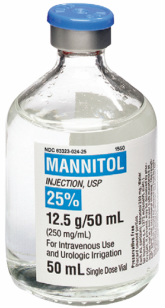Pharmacology definition - Mannitol

Mannitol
Mannitol is use in preventing and treating patient with acute renal failure due to shock or trauma. Mannitol is also useful in treating patient with increase intraocular pressure or intracranial pressure. Mannitol is a form of osmotic diuretics which reduce intraocular pressure or intracranial pressure by reducing the volume ( volume depletion).
Mannitol should be avoided in cases of patient who suffer from congestive heart failure. Mannitol is contraindicated in congestive cardiac failure due to development of the pulmonary edema.
Mannitol will cause an increase in the osmolarity of the tubule by acting on the descending limb of the loop of Henle or proximal tubule. Water will be drawn into the lumen of the tubule. There will be an increase in the outflow of the urine with decrease in the circulating volume.
The common side effects of mannitol may include dehydration, headache, gastrointestinal discomfort.
Mannitol is use in preventing and treating patient with acute renal failure due to shock or trauma. Mannitol is also useful in treating patient with increase intraocular pressure or intracranial pressure. Mannitol is a form of osmotic diuretics which reduce intraocular pressure or intracranial pressure by reducing the volume ( volume depletion).
Mannitol should be avoided in cases of patient who suffer from congestive heart failure. Mannitol is contraindicated in congestive cardiac failure due to development of the pulmonary edema.
Mannitol will cause an increase in the osmolarity of the tubule by acting on the descending limb of the loop of Henle or proximal tubule. Water will be drawn into the lumen of the tubule. There will be an increase in the outflow of the urine with decrease in the circulating volume.
The common side effects of mannitol may include dehydration, headache, gastrointestinal discomfort.
